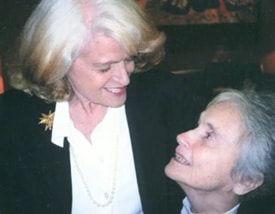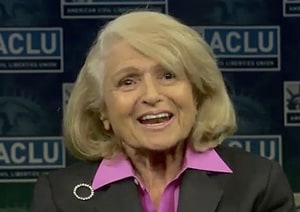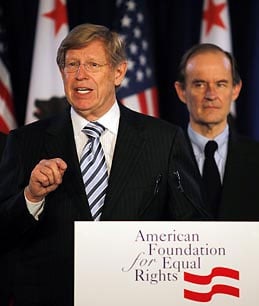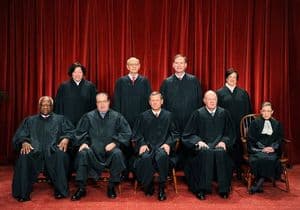The Supreme Court issued orders granting hearings in the Prop 8 case, Hollingsworth v. Perry, and one Defense of Marriage Act (DOMA) case, Windsor v. United States. The stage is set for a monumental 2013 at One First Street, with decades-long ramifications for the gay rights movement.
 Court watching is humbling, especially when you're (half) wrong. Like almost every commentator, I expected a grant in at least one DOMA case. I thought Windsor was the likeliest choice if the Court took only one: it offers an avenue for addressing scrutiny levels and would not require Justice Kagan to recuse herself. As Towleroad readers know, though, I did not expect the Court to grant the petition in the Prop 8 case, especially because of the narrowness of the Ninth Circuit's decision.
Court watching is humbling, especially when you're (half) wrong. Like almost every commentator, I expected a grant in at least one DOMA case. I thought Windsor was the likeliest choice if the Court took only one: it offers an avenue for addressing scrutiny levels and would not require Justice Kagan to recuse herself. As Towleroad readers know, though, I did not expect the Court to grant the petition in the Prop 8 case, especially because of the narrowness of the Ninth Circuit's decision.
But, being at the Supreme Court has its advantages. It means you can craft the question presented — the specific legal question the parties have to answer at oral argument and the Court wants to answer in its decision — pretty much any way you want. The way the Court specified the questions in both cases speaks volumes to the great potential to make remarkable strides toward equal honor and dignity under the law.
One thing is clear: The reason the Court took so long to grant these hearings is the complexity of the orders and myriad options open to the Court. Evidently, there was also a lot of strategy involved. That is, even though the Court gave itself great space to decide every substantive issues, each order includes a jurisdictional question that would allow the Court to avoid the substance if it really wanted to.
I discuss what that means, AFTER THE JUMP…
Hollingsworth v. Perry, challenging California's Proposition 8
The American Foundation for Equal Rights (AFER) is leading the charge against California's ban on same-sex marriage and achieved extraordinary success. That success reached its zenith when Judge Vaughn Walker issued a sweeping decision declaring that by discriminating against gay couples, Prop 8 violated the Equal Protection Clause and the Due Process Clause of the Fourteenth Amendment. The Ninth Circuit affirmed the decision, but took a step back from that broad holding, finding only that Prop 8 was unconstitutional because it took away already existing rights.
The Supreme Court is interested in the broader holding. Its order takes as the question presented whether, under the Fourteenth Amendment, California can define marriage as between one man and one woman. It did not limit its consideration of the case to the Ninth Circuit's taking away theory.
Plus, the Court will return to the "standing" question. If you recall, the Ninth Circuit Prop 8 decision took extra time because that court had to determine if the proponents of Prop 8, ProtectMarriage, could stand in the shoes of the state to defend the law when the state government refused to. The Court would like to determine that for themselves, and because jurisdictional issues are determined de novo – "from the beginning" — the Supreme Court is more than free to come to a different conclusion than the Ninth Circuit.
Windsor v. United States, challenging the Defense of Marriage Act
 The ACLU brought this challenge on behalf of Edie Windsor, who had to pay an exorbitant tax bill upon the death of her partner where every heterosexual widow would not. If you recall, this is the case where a relatively conservative panel of the Second Circuit held that heightened scrutiny is the appropriate level of scrutiny for DOMA and any state action that discriminates on the basis of sexual orientation.
The ACLU brought this challenge on behalf of Edie Windsor, who had to pay an exorbitant tax bill upon the death of her partner where every heterosexual widow would not. If you recall, this is the case where a relatively conservative panel of the Second Circuit held that heightened scrutiny is the appropriate level of scrutiny for DOMA and any state action that discriminates on the basis of sexual orientation.
This is the only DOMA case for which the Court granted a hearing. It said nothing about Gill, which was the First Circuit case decided on "rational basis with bite" and included a Tenth Amendment question. But, Gill was also the case in which Justice Kagan would have had to recuse herself, so that was the least likely to be granted.
The Court chose the Government's question presented — Whether DOMA Section 3 (one-man, one-woman definition of marriage for federal purposes) violates the Fifth Amendment — but also included two other questions: Does the fact that the Government agreed with the Second Circuit's decision deprive the Court of jurisdiction to hear the case? And, do House Republicans, who took up defense of DOMA when President Obama refused, have standing?
We all understand the main question. The second question is a bit arcane. Normally, a winner cannot appeal a lower court ruling. The Obama Administration argued at the Second Circuit that DOMA is unconstitutional, so a decision declaring DOMA unconstitutional agrees with the Government's position. That decision certainly made the ACLU and Edie Windsor winners, but whether it made the Government a winner — and thus, incapable of appealing it — is less clear. The Government argues that the Second Circuit's decision was a decision against a duly enacted Act of Congress that the executive was still obligated to enforce, notably against its will. Therefore, the decision was, theoretically, still against the Government.
By these questions, the Court gave itself space to answer both the underlying merits of the DOMA challenge and the scrutiny question. After all, it may not be possible to decide if DOMA Section 3 is unconstitutional without first deciding how to answer the question, i.e., heightened scrutiny versus rational basis.
Without being a fly on the wall in conference, the text of the orders and the decision to grant in certain cases but not others speak volumes about what happened, why it took so long, and what this could all mean down the road.
Each order includes an "opt-out." I mean that metaphorically, of course. The orders on both Hollingsworth and Windsor include jurisdictional questions that could decide the entire matter outright without letting the Court get to the substance of either case. So, if some of the justices feel their position won't get 5 votes, they may be more inclined to live to fight another day by making non-precedential decisions on jurisdiction now. This speaks to one of the main reasons why it might have taken so long to come to these decisions: strategy. The ideological wings of the divided Court may have been looking for ways to have a fall back position if they could not get a swing vote on their side, and sometimes, jurisdictional questions that prevent wide application of a decision beyond the one at hand offer that kind of safe default position.
What about scrutiny? The Windsor order did not specifically mention the appropriate level of scrutiny, but by taking the Windsor case, the Court may have recognized that the hazy scrutiny standard it has left in place since Lawrence v. Texas is no longer tenable. Windsor was the only DOMA case that forced the Government to stake out a scrutiny position; the Second Circuit was unique in that it had no historical precedent on the appropriate level of scrutiny for anti-gay laws. And, the Windsor decision put the level of scrutiny front and center when the court held that heightened scrutiny was necessary. The Court could always continue to muddle through or decide that DOMA is unconstitutional under any level of scrutiny and leave the law an unclear patchwork of scrutinies that varies from circuit to circuit, but the grant and its wording gives the Court the space to make a scrutiny decision.
 Baker v. Nelson is nowhere to be found. Baker is a 1971 case where the Supreme Court denied a hearing on a gay marriage case from Minnesota "for want of a federal question." That is, back then, the Court said that Minnesota's decision to deny licenses to gay couples was not a matter for the federal constitution. To this day, almost every brief supporting a marriage ban refers to Baker, arguing that it forecloses any Supreme Court review. That argument ignores 40 years of gay rights law, in general, and Romer v. Evans and Lawrence v. Texas, in particular, which changed the relationship between gay persons and federal law. The Court may indeed address, and likely explain away, Baker, but the wording of its grant suggests that it is not at the forefront of the Court's consideration.
Baker v. Nelson is nowhere to be found. Baker is a 1971 case where the Supreme Court denied a hearing on a gay marriage case from Minnesota "for want of a federal question." That is, back then, the Court said that Minnesota's decision to deny licenses to gay couples was not a matter for the federal constitution. To this day, almost every brief supporting a marriage ban refers to Baker, arguing that it forecloses any Supreme Court review. That argument ignores 40 years of gay rights law, in general, and Romer v. Evans and Lawrence v. Texas, in particular, which changed the relationship between gay persons and federal law. The Court may indeed address, and likely explain away, Baker, but the wording of its grant suggests that it is not at the forefront of the Court's consideration.
Is this a good or bad result? Granting Windsor gives the Court a unique opportunity to come together to declare DOMA unconstitutional, though it is not clear that the Court is ready to mandate heightened scrutiny. But, there is no doubt that the grant in Hollingsworth took me by surprise. Its framing the case in the broadest way possible offers a chance for a monumental victory or a great loss because the breadth of the case could have ramifications outside California. This is what Ted Olson, David Boies, and the AFER team wanted all along and the country is so much closer to accepting the freedom to marry in great part because of AFER's skillful engagement with the American public on marriage freedom.
What happens next? The Court has set the stage for a March argument and a decision on the last day of the Court's current term in late June 2013. For now, the Ninth Circuit's stay that prevents the implementation of Judge Walker's original order remains in place. Gays cannot marry in California just yet. But, they are oh so much closer to a resolution.
In the coming days, I will parse out more details and discuss some of these and other implications of this development. Please ask questions in the comments section and I will do my best to respond as soon as possible.
Congratulations to the AFER team and its plaintiffs, Kris Perry and Sandy Stier, Jeff Zarrillo and Paul Katami, and to the ACLU LGBT Project team, James Esseks and his attorneys, and Edie Windsor. The sacrifices they are making for all of us should never go unnoticed.
***
Ari Ezra Waldman teaches at Brooklyn Law School and is concurrently getting his PhD at Columbia University in New York City. He is a 2002 graduate of Harvard College and a 2005 graduate of Harvard Law School. His research focuses on technology, privacy, speech, and gay rights. Ari will be writing weekly posts on law and various LGBT issues.
Follow Ari on Twitter at @ariezrawaldman.




